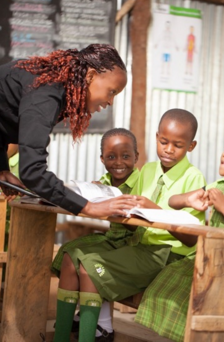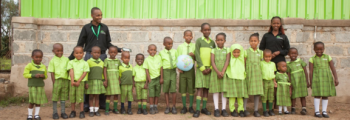A Private School System for 10 Million Kids—at $6 Monthly Tuition!
By: Professor Dennis Shaughnessy
That’s right, a private school in which poor children learn from highly trained teachers using an innovative curriculum and standardized low cost books and computer tablets for $6 a month. It’s called Bridge International Academies, with headquarters here in Cambridge and 400 schools in operation today teaching more than 100,000 poor children. The long-term goal at Bridge: 10 million children enrolled in their high quality, low cost private schools in poor communities in Africa, Asia and elsewhere in the developing world.
And it’s for profit.
Who would invest in a dream factory in the slums for poor children in search of hope? Bill Gates and Mark Zuckerberg, to name two.
Has it been vetted by global thought leaders? Try the cover of The Economist.
And NU students and alums are playing a small but important part, as curriculum writers in co-ops and full-time positions.
On January 27, our social enterprise students heard from the Director of Global Innovation of Bridge International Academies, Geordie Brackin. Geordie leads the innovation team for one of the most ambitious social businesses (i.e., for profit social enterprise) we’ve seen at SEI in a long time. The mission is to build a high quality and affordable educational alternative to poorly run public schools and drastically underfunded local private schools, on a global scale few experts in education or social enterprise would think possible.
Bridge has developed a unique business model that is disruptive to the education system in the developing world. They train young people from the local community to use technology to deliver a highly structured and standardized curriculum that has proven to be effective in improving learning among disadvantaged children. A simple Android phone at each “shack” schoolhouse sends the week’s or day’s curriculum to tablets known as “teacher computers”. These tablets in the hands of Bridge teachers not only deliver the class content, but also record how the teacher’s time is being used and all student test scores and other classroom data, collected daily across the 400 Bridge Academies. That data is reviewed and managed to constantly improve performance and insure effective teaching and improved student learning outcomes.
By keeping costs extremely low (from modest teacher salaries to low cost technology to un-electrified shacks), Bridge is able to project a profitable business charging an average of just $6 per child per month. And that’s for school days that begin at 7:00am and end at 5:00pm, Monday through Saturday. Teachers are present, on time, trained and monitored for quality, which is a radical improvement over the typical public or local private school alternative.
Bridge sees a market opportunity to teach up to 10 million students out of a global population of 800 million poor children of school age.

We often talk about how to build sustainable business models that use technology to disrupt ineffective existing systems in key areas of development like education, and replace them with innovative and entrepreneurial new ones that bring hope and opportunity. Bridge is a wonderful example of social innovation and social enterprise at work in the developing world, striving to make people’s lives better, and in a for profit model that uses profit to sustain the mission and build lasting change for the better.


